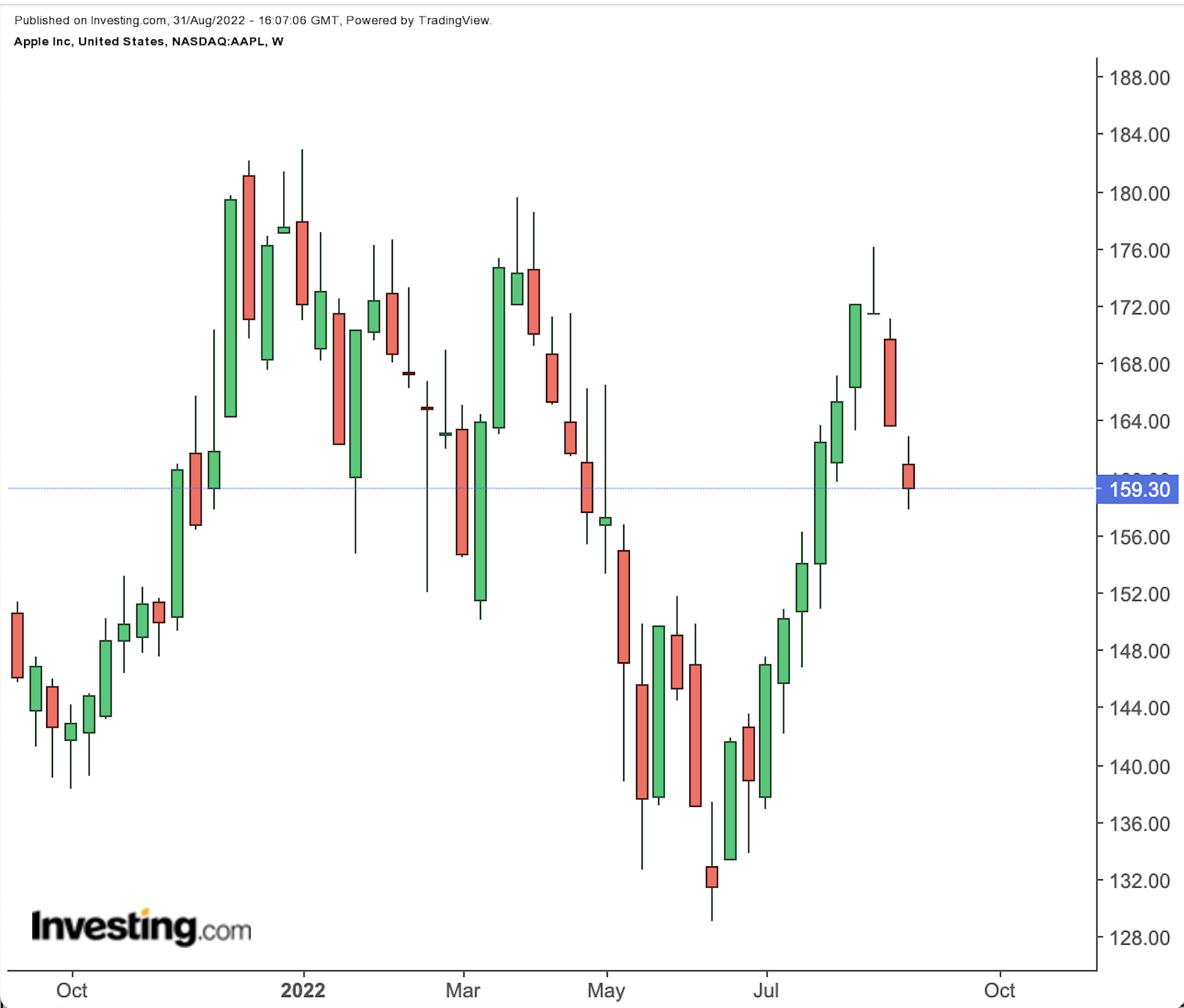Investing.com’s stocks of the week
- Investors have not seen a mature Apple operate in a negative macroeconomic environment
- The coming year likely presents a very real test
- Another pullback from highs suggests investors are worried about that test — and a still-hefty valuation
One of the key questions surrounding Apple (NASDAQ:AAPL) is how the company will perform in a weaker macroeconomic environment. And one of the difficulties in judging AAPL stock at the moment is that we don’t really know the answer.
To be sure, we don’t really know the answer to the key questions surrounding most stocks. That’s precisely what makes investing challenging, enjoyable and, hopefully, fruitful. But in the case of Apple, we don’t even have much evidence on which to base our answer. We simply haven’t seen this version of the company navigate significant external difficulties.
It appears likely that will change. Inflation is a worldwide issue, and economic concerns are rising in markets like China and Europe. Apple is a U.S. company, but more than half of its revenue and profit comes from overseas, meaning it’s exposed to a number of potentially difficult markets. With the stock still reasonably expensive, investors need to trust that Apple can perform well in any environment to consider owning shares — even with a pullback of late.

Source: Investing.com
Looking Backward
Obviously, Apple has been through recessions before. But, again, it wasn’t this version of Apple.
Bear in mind that the first iPhone only went on sale in June 2007. That was months before the global financial crisis hit. The iPhone did sell incredibly well: revenue from the product and “related products and services” was $1.84 billion in fiscal 2008 (ending September), and $6.75 billion the following year. But given how ubiquitous the iPhone would become, and how revolutionary it was at the time, the external economic climate likely wasn’t as big a deterrent as it is at the moment.
We can, however, look at the smartphone leader at the time. That was Research In Motion, now known as BlackBerry (NYSE:BB). RIM navigated the crisis just fine: revenue nearly doubled in fiscal 2009 (ending February), and rose another 35% in FY10.
We very nearly did get a real-world example of what inflation might mean for Apple. In 2019, President Donald Trump imposed a 25% tariff on Chinese imports and threatened to go further. Given that many Apple products are assembled in China, the company was at risk.
The additional tariffs were never implemented, but one analyst estimated a hit to annual earnings of roughly 50 cents to 75 cents per share. Based on Apple’s share count at the time (4.5 billion; the stock has split since and Apple has bought back shares as well), that suggested a roughly $2-billion to $3-billion annual hit. Over the last four quarters, Apple has earned nearly $100 billion in net profit.
Is This Time Different For Apple?
The history we do have suggests Apple should be able to manage through macroeconomic difficulties. But that conclusion is far from definitive.
When BlackBerry was the dominant product, and Apple was the upstart, the smartphone itself was novel enough that it may well have overridden other economic considerations. More importantly, even BlackBerry was nowhere near the market saturation Apple sees now. At the end of fiscal 2010, BlackBerry had 40 million subscribers. There are now more than 1 billion active iPhones.
At the moment, the iPhone, to at least some extent, is a luxury good. It’s certainly a better product than nearly all phones that run on the Android operating system from Alphabet (NASDAQ:GOOGL). But for most consumers in most markets, Android phones are far cheaper and presumably at least in the range of “good enough.”
Even for iPhone loyalists, budgetary pressures may impact choices. Customers may move to the lower end of the lineup, or push out replacements by a few months. And with the iPhone still driving more than half of Apple’s sales, modest changes can dull the company’s growth.
The risk exists outside of the iPhone as well. Apple’s impressive, and high-margin, services business relies on consumer spending on apps within its ecosystem. And, somewhat quietly, the iPad has once again become a contributor to growth: sales increased 50% between fiscal 2019 and fiscal 2021. Even if the iPhone is too important for strapped consumers to give up, the same may not be true for the rest of the company’s product portfolio.
Is AAPL Too Expensive?
What’s interesting about this discussion is that it echoes the bear case for AAPL stock that was prevalent during the last decade. The cited risk then was known as “commoditization.” Smartphones, the theory went, were no different than essentially every other form of electronics. When first released, they were expensive; over time, quality improved and price declined, eroding profit margins.
Obviously, that bear case has not played out. Apple, in fact, has steadily raised prices over the iPhone’s 15-year history at a rate greater than that of inflation.
Even with those price increases, Apple’s gross margins hadn’t moved much until recently. It’s the services business driving that spike; at 72% during the first three quarters of FY22, gross margins in that category are nearly double the 37% posted in products.
The question becomes, then: What if Apple can’t raise prices? Margins do take a hit — and that hit would be amplified amid higher input costs as well.
To be sure, these concerns are mostly around the edges of the investment case. The bears who predicted commoditization badly underestimated Apple, and investors now should not make that mistake.
Still, there’s a risk that in a more negative external environment, Apple’s profit growth stalls out. That’s why AAPL stock has been so sensitive to macro fears, and it’s why there’s real risk in paying a still-steep earnings multiple at the moment.
Disclaimer: As of this writing, Vince Martin has no positions in any securities mentioned.
